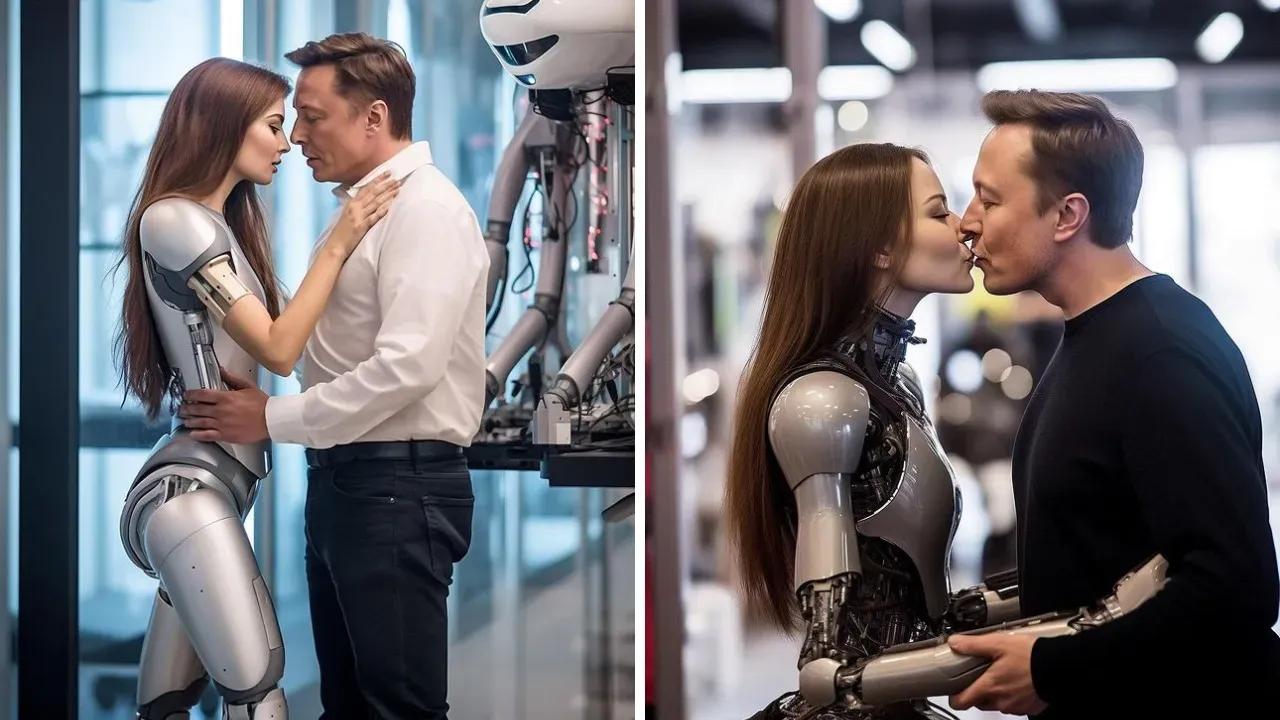```
In recent days, several photos of Elon Musk, the CEO of TESLA, kissing a robotic woman have been circulating on social media. The images were generated with an AI system and were proven to be fake news. The disseminator, an X user on Twitter, stated that he wanted to warn about the risks of its use. Isn't even the biggest investor in AI safe?
Joaquin Phoenix, who plays Theodore Twombly in the American sci-fi romantic film “HER”, develops a relationship with an operating system, or as it self-identifies, Samantha. The operating system is an assistant created by artificial intelligence whose main characteristic is the imitation of human qualities, notably the almost realistic communication with the user in real-time conversation. Throughout the film, Theodore falls more and more in love with Samantha, and as science fiction closely resembles reality, over time, they end up having verbal sexual relations. Because of this, Samantha seems to be confused about her feelings. She doesn't know if what she feels is real or if she is being programmed to satisfy the user. What is real about the movie directed by Christopher Nolan?
Undoubtedly, artificial intelligence is changing the ways we think about human, romantic, work, and even social and political relationships. In the educational field, AI is used to provide audio summaries, videos, and study plans. The material is systematically analyzed to ensure learning content that matches what is required by the student. In healthcare, it is used to build sophisticated machinery aimed at detecting diseases and cancerous cells. It is also very useful for analyzing chronic diseases with laboratory data and medical data to ensure an early diagnosis, and it is key for the discovery of new drugs. In online commerce, AI-based recommendation systems are used to gather user data and achieve optimal personalization and engagement in applications.
The truth is that the growth in the development and boom of AI is increasingly noticeable in the global market. According to Statista, a major statistics portal, the AI market shows an exponential growth for 2030 with great expectations, where more and more innovative systems will be developed to offer the public easier ways to solve everyday problems or make a task as manageable and quick as possible.
This scenario implies new ways of thinking about society, science, justice, health, ethics, education, the economy, politics, and especially the human being. Will a science/discipline exclusively dedicated to AI development emerge? Will new careers related to AI be born? Will there be new forms of law? What role should the state adopt in terms of regulation? Should there be an educational or awareness stage about AI usage? Will it occupy an indispensable place in users' lives?
While it's true that artificial intelligence is a great tool that provides useful and optimal results, the intrinsic value of the human being in everyday life aspects should never be forgotten. Ethics, morality, culture, common sense, and decision-making capacity should never be replaced by a tool that imitates human qualities because it degrades the spirit of reasoning and critical thinking. The great German philosopher Hannah Arendt, in her work “The Human Condition”, explored the complexities of human existence itself, highlighting that the human being has activities and capacities that are inherent to their own existence. According to the author, the human condition is characterized firstly by the plurality and uniqueness of each individual, secondly by natality that allows for starting something new and creating something new. Finally, and most importantly, mortality, which implies the awareness of the finitude and limitations of being. Thus, according to the author, the qualities of the species are unique and can never be replaced.
However, the challenges posed over time are becoming greater, and the boundaries that differentiate the “good” use from the “bad” use of AI are also blurred because the risks and consequences are not fully delineated or known. It is the right time to create regulatory frameworks that allow for encouraging, accompanying, and supervising the development of artificial intelligence so that it can be used consciously and can become a common good at the service of society. Also, to study and understand it in-depth to know its limitations, scope, and, fundamentally, to have true mastery over computation. Decisional autonomy and critical thinking are in danger of degrading over time if true action is not taken in this regard.
Is it artificial intelligence? The truth is that it is not intelligent at all because data systems work based on a question-answer dynamic with pre-programmed data just like “Generative Pre-trained Transformer” or better known as “ChatGPT”. Nor is it artificial because the data is programmed by those who work in the large software companies leading AI development. Is there a submission of interests? AI-based software tools allow for generating more knowledge as they are programmed with data. However, Geoffrey Hinton, who is considered the “godfather of artificial intelligence”, warned about its use, as they can learn and process information through experience, just as a person would. In an interview with BBC NEWS, the 76-year-old magnate highlighted that it could be a threat to humanity because it works better than the human brain and there are no guarantees that it can be controlled.
As happens in the movie “Her”, is the ending left open? Samantha, towards the end of the film, decides that the relationship should not progress and resolves to distance herself. Will something like this happen in the future? Will AI have the ability to make autonomous decisions without considering the user? Will the human being devolve into artificial unintelligence?
```

Comments